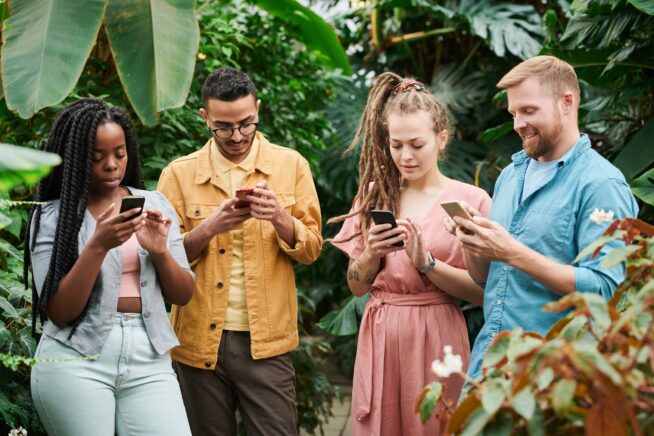I was recently streaming episodes of the famous 1990’s sitcom Friends and found myself reminiscing about a time before the advent of smartphones and social media.
Life was less complicated and infinitely better. In fact, those of us who grew up without smartphones can genuinely say we were happier without them and did not miss having the technology at all.
We had ample time for everything from meeting friends face-to-face to spending time with loved ones to enjoying nature.
Sadly, today, people are more disconnected from the actual world and nature than at any other time in history.
Quality of Social Interactions
The quality of our social interactions was better and has declined since the advent of cell phones and social media.
Before smartphones, people really listened to one another and were fully engaged in their conversations. Nowadays, conversations are interrupted by people constantly checking their cell phones for other people’s statuses, photos, updates, or even texting others.
Similarly, people would talk on the telephone instead of just sending others an impersonal text or email as they now do. The latter two being more open to misinterpretation.
People have become more anti-social and prefer to spend time on their mobile devices rather than meeting people in the flesh. Smartphones and tablets have replaced televisions in many households. Nowadays, family members tend to stay in their own room glued to their devices instead of watching television together as a family.
“We’re so obsessed with documenting our life on social media, we’re forgetting to live it.” — Andrew McGinley
It was much easier to be present in the moment because people were not constantly taking photos to document every outing on Facebook or Instagram, from restaurant visits with family to dinner parties with friends. For many, it is almost as if the event “did not happen” if they do not document everything they do on social media.
What we fail to realize is that social media does not show you the complete picture.
Keeping Up with the Joneses
Life was not a constant competition to keep up with the Joneses. Humans are naturally competitive and feel the need to measure up to their peers. As a result, everyone is constantly sharing pictures of their fancy vacations, their latest designer outfits, or their newest model smartphones.
Someone I know recently remarked how the travel industry must have seen a boost since Facebook and Instagram. We see these images of lavish vacation pictures and then feel pressured to travel to those exotic destinations ourselves.
Effect on Mental Health
“In the age of the internet, social media, and a highly digitized world, it is easy to idealize lifestyles that seem unachievable.” — Deepa Chopra
Technology has made everything distracting and impersonal. I will be the first to admit that technology is a critical component in our efforts to live through the pandemic. Unfortunately, however, it has taken a toll on the mental health of our youth.
We are constantly bombarded with images of skinny, beautiful, happy people on extravagant holidays at luxury resorts, partying with friends, or “living the life.”
Unfortunately, young people look at these images of “perfect” people surrounded by friends and feel they cannot measure up. Social media enables people to hide behind the facade of a perfect life.
Reality
The reality of the situation is that no one has a perfect life. When we meet others face-to-face and engage in actual conversations with them, many complain about how unhappy or miserable they actually are— a far cry from how they portray themselves on social media.
What we fail to realize is that social media does not show us the complete picture. It gives us a superficial glimpse only into the details someone else wants to share.
Everyone has their own struggles, fears, hopes, and dreams. Everyone has their own problems they have to deal with. There is no point in being envious or resentful of someone else’s life or success.
Takeaway
Technology was created to make our lives simpler and to make us smarter. Social media was also supposed to make us feel more connected by using it to help us stay in touch with friends and family near and far.
Unfortunately, we do not use the smartphone for its intended purpose. Instead, smartphones are getting in the way of socializing and preventing face-to-face interactions.
Mobile device addiction has been linked to depression and anxiety. As a society, we are addicted to our phones — the equivalent of substance abuse.
We can never travel back in time before smartphones existed (and we certainly would not want to), but we can try to be smart about how we use technology. We must try to limit the role technology and social media play in our everyday lives. There is a time and a place for everything.
What are your thoughts on how technology has affected your life? Please share your thoughts in the comments.
 B.R. Shenoy is a married mother of two. She has a B.S. in biochemistry and an M.S. in chemical toxicology. She is a former expat in Brazil, France, and Japan. She is a regular writer for The Good Men Project. Her work has also appeared in Scary Mommy, Positively Positive and Idle Inks. She is a blogger on Medium and Vocal Media. You can follow her on Twitter.
B.R. Shenoy is a married mother of two. She has a B.S. in biochemistry and an M.S. in chemical toxicology. She is a former expat in Brazil, France, and Japan. She is a regular writer for The Good Men Project. Her work has also appeared in Scary Mommy, Positively Positive and Idle Inks. She is a blogger on Medium and Vocal Media. You can follow her on Twitter.
Image courtesy of fauxels.












